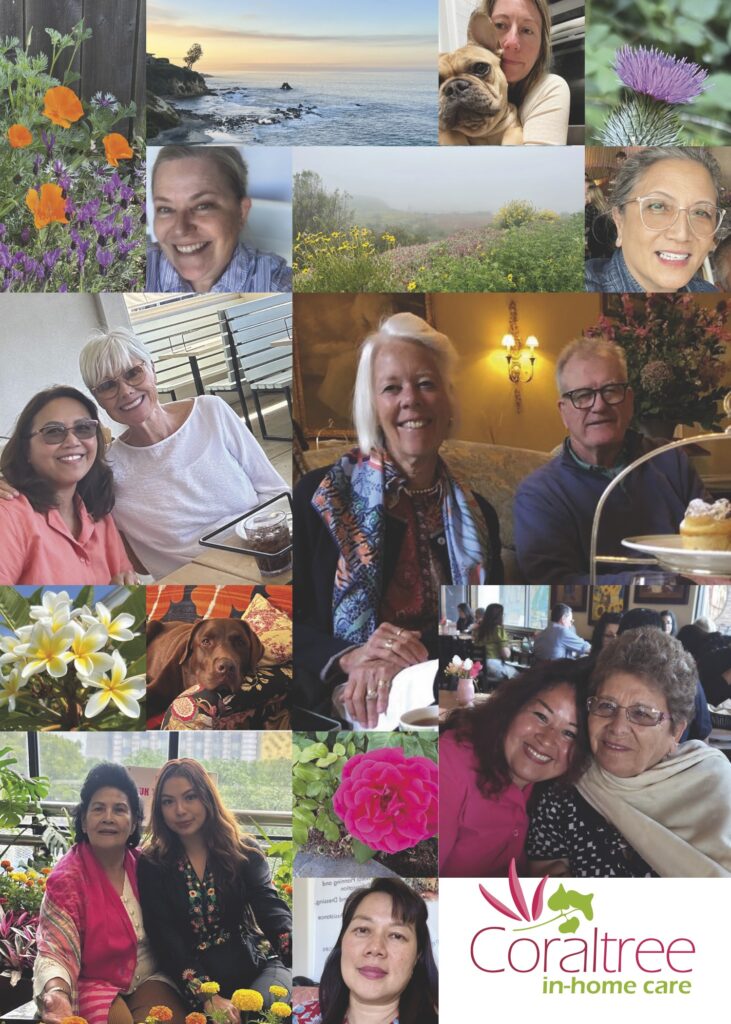Our In-home Care & Caregiving Services
We provide caregivers, care management, old-fashioned kindness, and neighborly support to older adults who want to live at home safely, comfortably, and as independently as possible.
Since 2010 we’ve helped some 800 families in Newport Beach, Laguna & beyond live safer, happier lives.
We are based in Newport and offer hourly, 24-hour, and live-in care throughout Orange County: Newport, Laguna, Newport Coast, Corona del Mar, Irvine, Huntington Beach & neighboring Southern California communities. (If we can drive to you, we can take care of you!)
Not only do we provide caregivers, but we also provide a dedicated care manager for each of our clients.
In 2024 we “welcomed” a licensed vocational nurse (LVB) on staff (our beloved Cynthia – who all of our longtime friends & clients will already know).
Our incredible caregivers & our care management & office team have years & years of experience supporting older adults and their families.
Please feel you can call us anytime: (949) 706 7550.
We’re happy to help each step of the way!
Coral Tree provides:
Hourly Care
24-hour Care
Live-in Care
A Dedicated Care Manager for Each Client
Licensed Vocational Nurse (LVN) on Staff
Scheduling
Long-term Care Insurance Support
Home-baked Cookies & More!
Workers Comp & Liability Insurance
And the myriad & varied ways our caregivers support our clients include:
Help with Daily Routines
Personal Care
Support with Activities of Daily Living
Dr. Appointments
Music Therapy
Fall Prevention
Companionship
Exercise & Physical Therapy Support
Transportation
Social Interaction
Light Housekeeping
What Are Some of the Benefits of a Coral Tree Caregiver? How Can They Help?
Respite for Family Caregivers
Being the sole caregiver for a loved one with dementia or Alzheimer’s can be both physically and emotionally depleting. Family caregivers are less likely to make routine doctor’s appointments, and more likely to report increases in depression and anxiety.
According to EverCare’s 2006 study, Caregivers in Decline, ninety percent of family caregivers reported experiencing more worry and stress; and seventy percent reported spending less time with family and friends: “The caregivers who were surveyed find themselves in a downward spiral of health that worsens as a result of giving care.”
We can help ease the strain and provide respite for family caregivers – be it a few hours a week or helping with full-time care.

Our friends Pat & Elyta.
Elyta’s worked with us since 2013 & feels her purpose in life is to help others.
“I love my work,” Elyta says. “I really enjoy helping my clients feel better and change for the better. I love it. I feel so honored and proud that I can help this person to feel better, and then he or she is having a good life in the long run, and their kids are happy… That’s what we caregivers love.”
Bathing, Dressing, Grooming, Toileting
What we think of as simple daily self-care acts can become increasingly difficult to do on one’s own as our bodies age and become more fragile.
It can be humbling to have to accept help with personal care, but being able to safely shower and dress without fear of falling or hurting oneself can allow older adults to continue to live at home confidently and with dignity.
As well, being able to feel clean every day, to be able to get dressed properly, to have one’s make up and hair done, can help us feel our best, combat depression, and greatly contribute to our sense of self-worth and well-being.
Companionship & Social Interaction
We have seen again and again how the companionship of a kind and loving caregiver can have a profound effect on someone’s life and health.
We often think of caregiving as helping with the physical needs of older adults – and that’s usually why families first contact us: a parent is living alone and has fallen, for example – but it is often the emotional and psychological support that our caregivers offer that has the most profound effect on our clients’ well-being. Simply having someone that is a stable, reliable presence in your every day life can make a world of difference in someone’s life.

“Never, ever give up on hope, never doubt, never tire, and never become discouraged. Be not afraid.” – Pope John Paul II, Forever in our hearts.
Studies, such as the classic 1988 “Social Relationships and Health” by House, Landis, and Umberson have shown that social interaction can have as much an impact on physical health as blood pressure, smoking, physical activity, and obesity. And yet the conditions of modern western society often result in older adults ending up very alone and isolated.
“In contrast with the 1950s, adults in the United States in the 1970s were lies likely to be married, more likely to be living alone, less likely to belong to voluntary organizations, and less likely to visit informally with others. Changes in marital and childbearing patterns and in the age structure of our society will produce in the 21st century a steady increase in the number of older people who lack spouses or children – the people who whom older people most often turn for relatedness and support. Thus, just as we discover the importance of social relationships for health, and see an increasing need for them, their prevalence and availability may be declining. Changes in other risk factors (for example, the decline of smoking) and improvements in medical terminology are still producing overall improvements on health and longevity, but the improvements might be even greater if the quantity and quality of social relationships were also improving.”
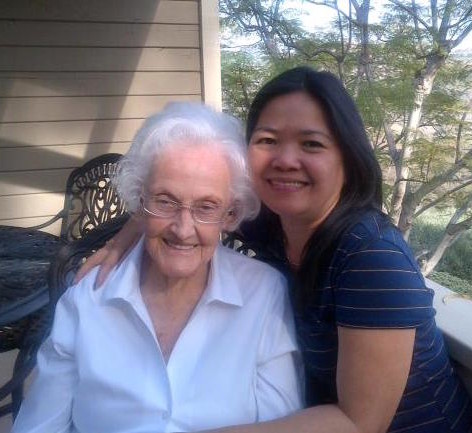
Wanda & Susan: a beautiful friendship.
You can read a piece Cassidy wrote about Susan here:
“Gratitude for Our Caregivers: Susan”
Many older adults end up incredibly isolated.
A 2008 University of California San Francisco study found that loneliness directly contributes to a decline in health and premature death in older adults.
“’In our typical medical model, we don’t think of subjective feelings as affecting health,’ says Carla Perissinotto, MD, MHS, assistant professor in the UCSF Division of Geriatrics. ‘It’s intriguing to find that loneliness is independently associated with an increased rate of death and functional decline.'” (You can read more about Dr. Perissinotto and other UCSF researchers’ finding here: “Loneliness Linked to Serious Health Problems and Death Among Elderly”.)
Continuing favorite activities & hobbies
Being able to engage in activities we love helps keep us physically and mentally active, and can also provide joy, contentment, and a sense of self-worth in our day-to-day lives. This is true throughout our lives, but even more so for older adults.
Older adults who are able to continue engaging in hobbies actually live longer. One fourteen-year Swedish study found that people who played music, read books, or regularly visited the cinema, concerts, museums, or art exhibitions had greater life expectancy than those who did not.
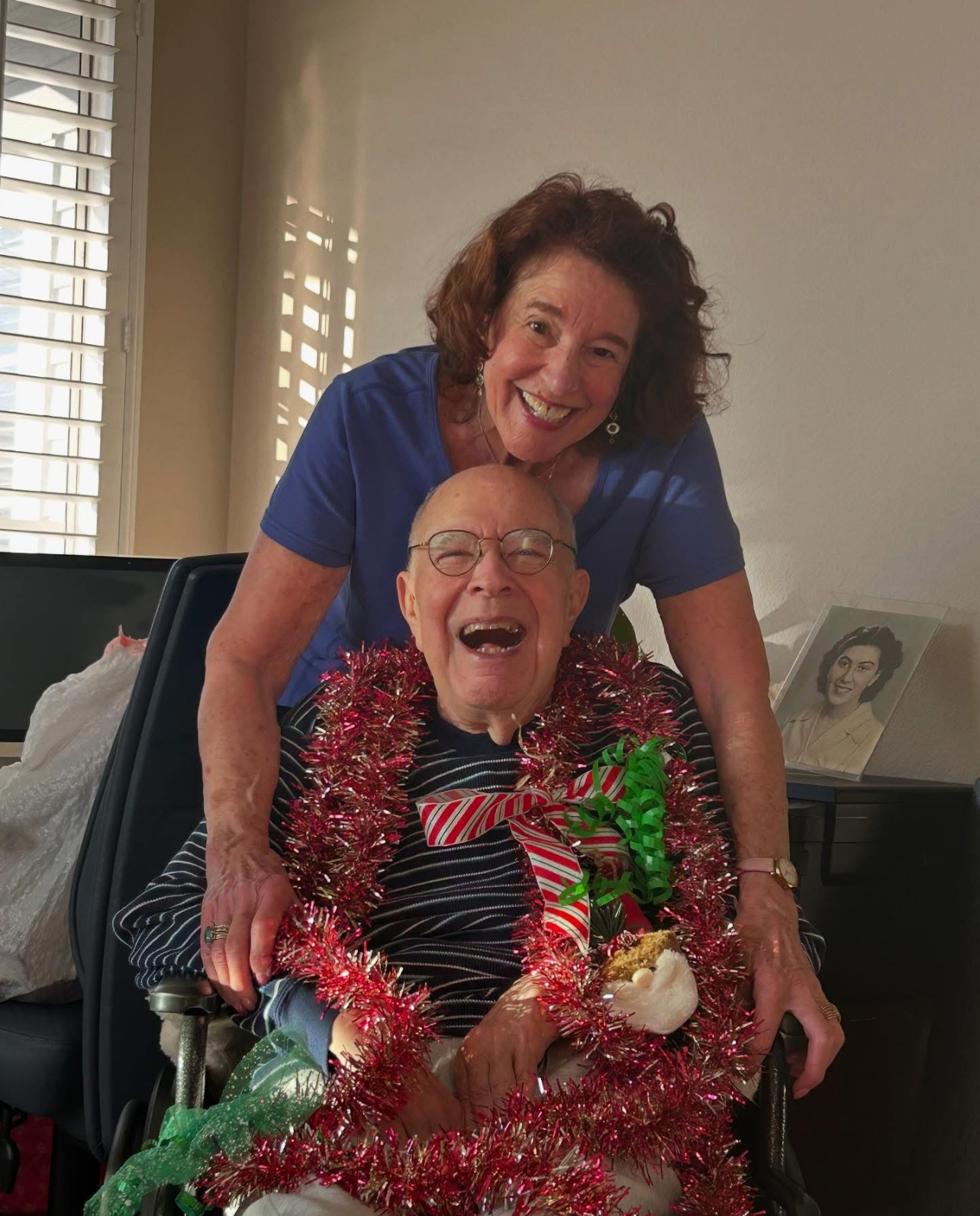
“Love Emobodied” ~ Our Beloved Sheila & Don (photo by our precious Marta)
“When you truly love God you will see him in each face, and will know what it means to love all. It is not forms and egos we should adore, but the indwelling Lord in everyone. He alone informs his creatures with life, charm and individuality.” – Sri Sri Paramhansa Yogananda
Reading
Especially for older adults, being read to can provide an important avenue of escapism. One’s body might not be able to be as active as in the past, but the mind can still imagine and books allow one to be immersed in other experiences, and even stimulate the same parts of the brain as if were were engaging in the same physical activity as the characters in the book.
“It turns out when we’re immersed in a great book, it’s not just the parts of the brain that deal with language processing that are hard at work. In fact, when we’re deeply engaged with a story our brains mirror the actions and feelings of the characters. So if someone in the novel you can’t put down is swimming, the sections of your brain that would light up if you yourself were paddling across a pool also activate.”
Light housekeeping and laundry
Transportation needs
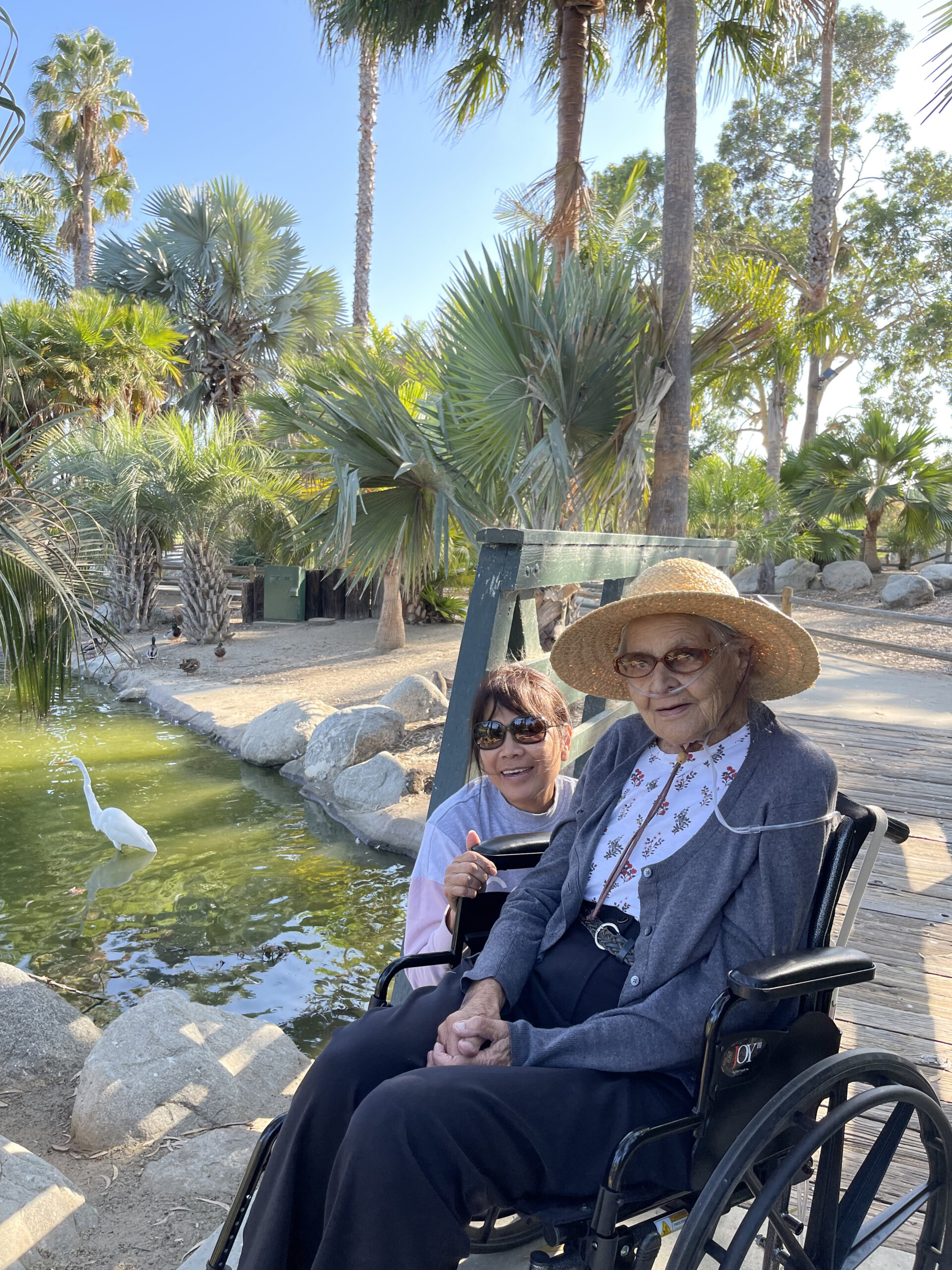
Our friends ChaCha & Jean.
You can read Kate’s interview with Jean here:
“Jean Watt: What Can I Do? A Life of Service & Compassionate Action”
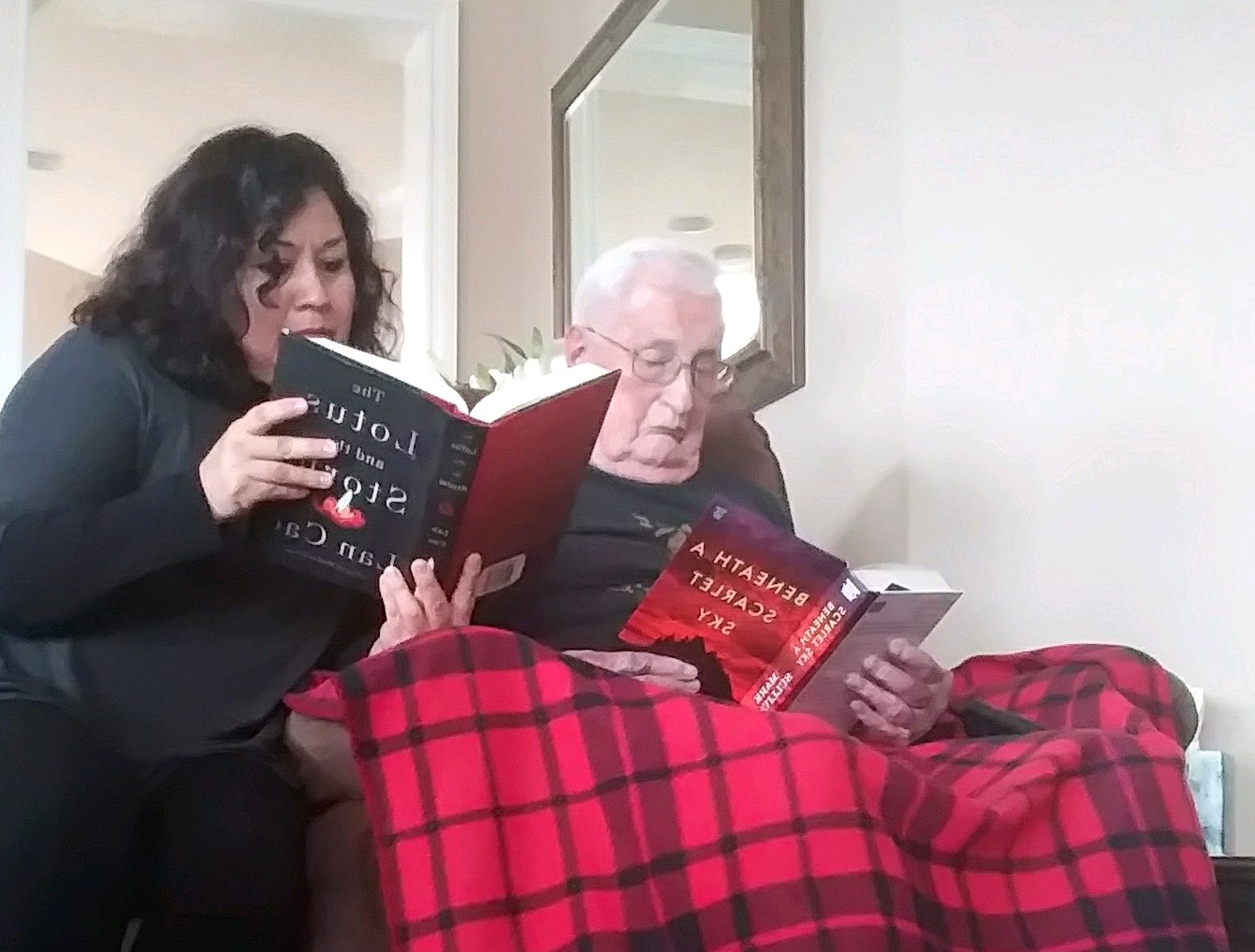
Marta & Ken
Doctors Visits
Exercise & Physical Therapy Assistance
We all know the positive effect that regular exercise can have on our health and and physical and psychological well-being.
Studies have found that as little as one hour of exercise a week can help prevent Dementia. See “One hour of exercise a week ‘can halve dementia risk.’”
Safe Transfer Support
Medication Reminders & Planning
Meal planning and preparation
Fall prevention
Falls are the leading cause of injury-related visits to emergency departments in the United States and the primary etiology of accidental deaths in persons over the age of 65 years. See “Falls in the Elderly,” GEORGE F. FULLER, COL, MC, USA, White House Medical Clinic, Washington, D.C. Am Fam Physician. 2000 Apr 1

Kate, Jane (aka Gigi), and Nita, Jane’s “best friend.” You can read a piece Kate wrote about Nita here.
Help with Daily Routines
The familiarity and structure of daily routines can provide a life-line for our loved ones with Dementia or Alzheimer’s.
“Because the dementias reduce flexibility and adaptability, the vast majority of patients do better in a stable, predictable environment, every very early in the illness,” says Peter Rabins in Practical Dementia Care. “Ideally, these routines should be patterned after those that the patient and family have followed for years.”
We generally have positive associations with that which is familiar to us. In a world that is often quickly changing, unclear, confusing, daily routines can provide small anchors of comfort and safety throughout the day.

Marty & Ernie. “We cannot say enough about how loving Ernie was, as well as how encouraging and positive he was to our Dad.” – Carol, Newport Beach
“Familiar things — food, music, activities, surroundings, etc. — make us feel comfortable,” says Dr. Raj Raghunathan in “Familiarity Breeds Enjoyment” in Psychology Today. “From an evolutionary perspective, it makes sense that familiarity breeds liking. Generally speaking, things that are familiar are likely to be safer than things that are not. If something is familiar, we have clearly survived exposure to it, and our brain, recognizing this, steers us towards it.”
Daily routines have been found to reduce stress and anxiety, and improve mood, and sleep. Studies have shown that seniors who have regular daily routines sleep better and experience less insomnia. Ultimately, daily routines can dramatically improve quality of life for older adults
“The close relationship between mood and pleasant events for individuals of all ages has been demonstrated for many years,” say University of Washington researchers Rebecca G. Logsdon, Susan M. McCurry, and Linda Teri in their 2007 study Evidence-Based Interventions to Improve Quality of Life for Individuals with Dementia. “Older adults with chronic illness, particularly those with dementia, are especially vulnerable to loss of pleasant events and subsequent mood disturbances, as increasing cognitive impairment causes a loss of ability to engage in rewarding and enjoyable activities, which in turn leads to increased depression and decreased quality of life.”

Important Reminder!
Additional Support
Complimentary Home Safety Inspections
Music Therapy
Pet therapy
Running errands for your loved one
Shopping assistance
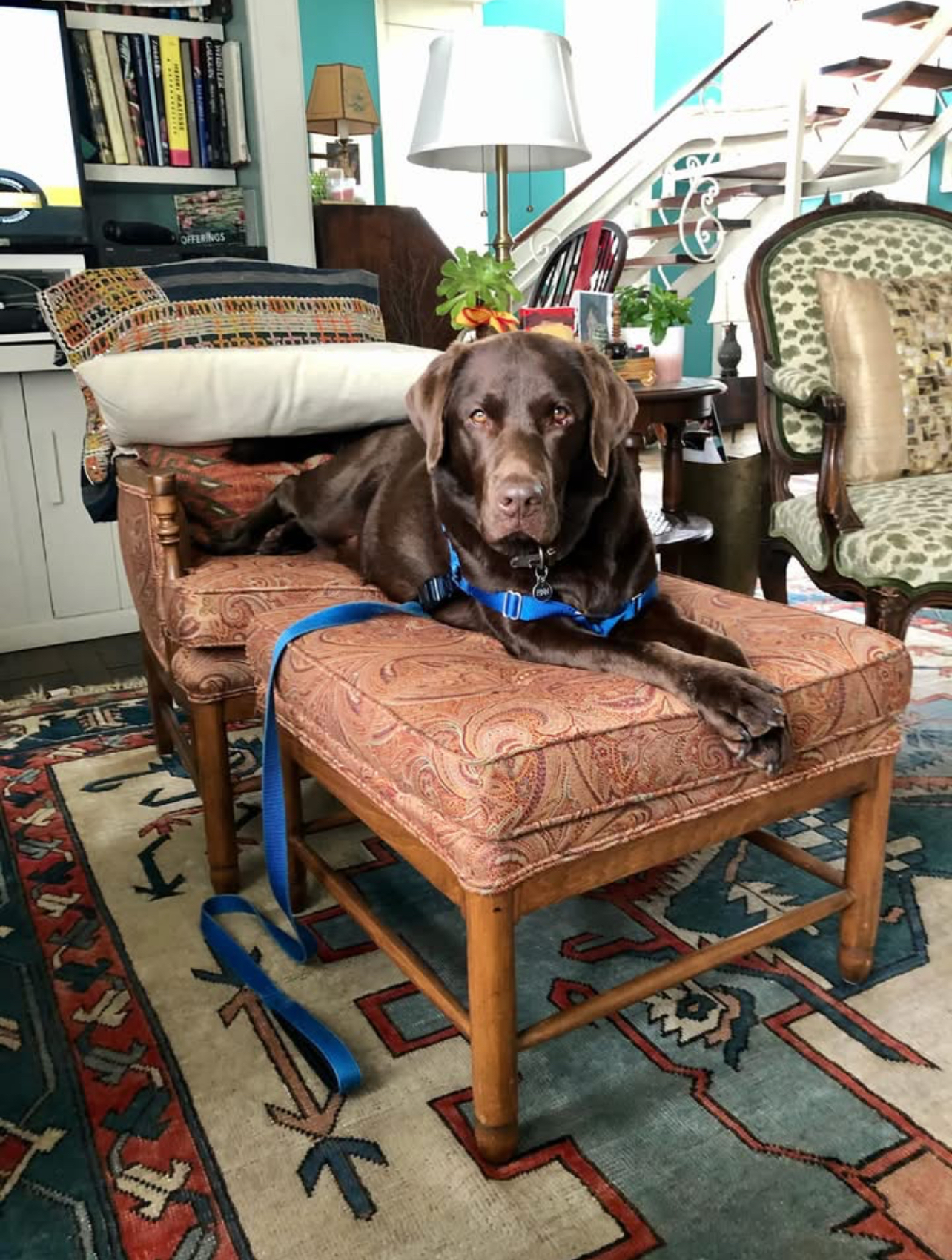
Mr. Finn aka Coral Tree’s Chief Pawficer of Office Morale and Management says: “If you’d like to to hear what I have to say about VERY important matters, you can read some of my Coral Tree blog posts here. My assistant, Kate, is very lazy and only has shared TWO of my very important posts to date! What’s a good dog to do?!?”
